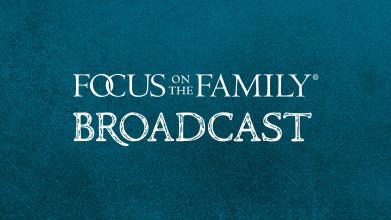Preview:
Ted Cunningham: If you have a tough day at work and you get in the car, and your first person you’re going to call is your mom not your wife, that’s a problem.
End of Preview
John Fuller: Ted Cunningham is with us today on Focus on the Family, and your host is Focus president and author, Jim Daly. I’m John Fuller.
Jim Daly: John, here at Focus on the Family, we love marriage and I hope people feel that and know it. Uh, it’s foundational to the family and it’s a gift from God. And we need to lift marriage up to its proper place. And I think in many ways, restore, uh, what God intended with marriage. In fact, um, it’s the reason why we talk so much about it here on our program. We like to equip you with those tools to help you live your marriage in such a way that others are going to see something wonderful and beautiful in your marriage. It’s, uh, a witness to the world. Uh, today we’re targeting newly married couples, but this also applies to their parents. That’s the good news, we’re all going to benefit from the discussion today. Uh, we’ve got some solid, trusted advice about the importance of God’s design to leave behind your childhood family and cleave to your spouse. So we’re putting this in the family formation category. And we have invited o- one of the best speakers and authors on the topic of marriage, and that’s Pastor Ted Cunningham. He’s the founding Pastor of Woodland Hills Family Church in Branson, Missouri. And Ted, you’ve seen a few weddings, I think. Uh, does one stick out like uh-oh (laughs)?
Ted: Oh, boy.
Jim: I remember- I remember one- I was in a wedding and the guy passed out, one of the groomsmen keeled over into the candelabra, which almost caught the, uh, the drapes on fire (laughs).
Ted: Uh, I’ve had them from, they- they’ve been so out of control crying they can’t say the words to-
Jim: That’s sweet though.
Ted: … that- that is. And you have to pause, you have to wait. I’ve never had a bride or groom pass out, but I have had groomsmen [inaudible].
Jim: Yeah, why is always the groomsmen? What are we doing wrong?
Ted: Uh, they’re not even really doing anything.
Jim: Are they bored or they’re falling asleep? (laughs) What’s happening?
Ted: They have one job.
Jim: (laughs)
Ted: They have to stand there in a tux. That’s it. That’s your only job. If you can’t make that happen, uh, we- we picked the wrong guy.
John: And as Jim said, Ted’s the founding pastor of Woodland Hills Family Church in Branson, Missouri. And he’s a popular author and speaker, a very funny fellow, I might add. And, uh, you’re going to have fun today.
Jim: Uh, Ted, formally, welcome to Focus on the Family.
Ted: Great to be back.
Jim: Now, Ted, you are a contributor to a compilation book that we worked on. Actually, it’s a series of things, uh, DVD curriculum and other things. Ready to Wed. I think Greg Smalley, who kind of orchestrated that resource and the other attached resources, saw that if a couple receives 10 hours of counseling or more, their risk of divorce is significantly reduced. Um, you’re a pastor, you’re counseling couples who are thinking of getting married. Do you see that play out in your own- in your own church?
Ted: Oh, absolutely. We- it’s a requirement for us. If- if you are wanting to get married, you know, at our church or by someone from our church, uh, we- we require a minimum of six hours, believing 10, 12 is better. But our goal is that you don’t just go through premarital, you- after you- you get married, you plug into biblical community through a small group or home group.
Jim: You keep growing?
Ted: Yeah.
Jim: Yeah.
Ted: And continue to grow.
Jim: I can remember when Jean and I did our premarital counseling in Southern California, I remember there probably a dozen couples involved. And it was a all-day Saturday, uh, for two or three Saturdays, I can’t remember. But on the second or third Saturday that we were doing this, I remember three couples got up and said we’re not ready and we may not be right for each other. Which is a mark of success-
Ted: Yeah.
Jim: … isn’t it?
Ted: Absolutely. And I think for- for Amy and I, we (laughs) we went through a lot of skills based premarital. And what I loved about Ready to Wed, and- and it’s Greg and Erin Smalley’s heart and passion for marriage, is more at the heart level. We never really got into the heart conversations and the family of origin issues, and the messages written on the heart. We were dealing with budgeting and dealing with, you know, the first night of intimacy. And anyway, we were going through more of the skills and not so much the voices or the messages written on the heart.
Jim: Which is what really crops up in the marriage pretty quickly. Um, you may not see it in that honeymoon period, the first maybe a year or two, but those things will eventually begin to pop their heads up like groundhogs, right? (laughs)
Ted: Yeah. And it’s- it’s-
Jim: … whack-a-mole.
Ted: … it’s that moment, you- you’re trying to figure out why your- your spouse says or does the things they do. And then you’re over at your in-laws house and your mother-in-law-
Jim: (laughs)
Ted: … and your father-in-law says or does something, and you had that moment where you’re like, Huh, that’s it-
Jim: (laughs)
Ted: … right there.
Jim: You see it in live action.
Ted: That’s it. I just saw it. Now I know where it comes from.
Jim: Now being a guy, the one thing not to say in that moment is, “Honey, you remind me of your mother.”
Ted: Yeah. Oh, you never do it.
Jim: (laughs)
Ted: You never do it. (laughs)
Jim: That’s not good advice. Uh, what would Amy say, your wife, about good things a woman shouldn’t say about her husband?
Ted: Yeah. Amy, when- she’s seeing more and more of my dad coming out in me.
Jim: (laughs)
Ted: And- and- and there’s a lot, I get my- the mom that comes out in me, my mom gets excited very easily. I get excited very easy when things are happening. And- and- and I love to tell, you know, my family to calm down. Hey, hey, everybody calm down, calm down.
Jim: Because that’s a good place.
Ted: Yeah. I guess, we’re at a good… And Amy reminds me, We are calm. We are all calm in this room, Ted right now, but you.
Jim: (laughs)
Ted: But we, uh, we see- we love now seeing, you know, after being married for 20 years, uh, how much the family of origin still plays into it.
Jim: Oh, isn’t it?
Ted: Yeah.
Jim: And the older you get, the more obvious it gets, I think.
Ted: Well, and the-
Jim: I don’t know.
Ted: … older you get, the more I appreciate it.
Jim: Yeah.
Ted: Probably 5-10 years ago, even I’m seeing my mom and dad come out and me I’m like, Oh. But now I’m, as they’re getting older even I’m saying, those are the qualities I’m- I’m wanting.
Jim: Well, and that was the section that you contributed-
Ted: Yeah.
Jim: … in Ready to Wed, which was the leave and cleave. Now that almost sounds very Christianese.
Ted: Yeah.
Jim: And, uh, it would be good for people that don’t even understand what we’re talking about. What is leave and cleave?
Ted: Yeah. Genesis 2:24 says, For this reason, a man will leave his father and mother, be united to his wife, and the two become one flesh. Most of the time we look at that verse as a marriage verse. But the first half of that verse is parenting. For this reason, a man will leave his father and mother. In other words, it’s the job of a parent to make sure a child leaves home as an adult, not on a journey to become one. That’s the most important thing. Biggest mistake I think we make as parents today is we treat our children like children right up until the very moment we expect them to be an adult.
Jim: Wow.
Ted: And so, for- for me, it’s not academics, it’s not athletics, that raise our children into adults, it’s parents. And it doesn’t say for this reason a child leaves his mom and dad, it doesn’t say, For this reason an adolescent leaves his mom and dad. It says an adult. Wow. I think about that. My- I’m supposed to send my children out of the home not on a journey to become an adult, but as an adult, prepared for the responsibility of work and relationships, and in the context of Genesis 2:24, cleaving. I- I’m supposed to be preparing my son at 11 years old right now to be a husband, and my daughter at 13 soon 14 to be a wife. That’s my responsibility. And that’s where we get into the whole leave and cleave. I am preparing my children to leave. If ask my 11-year-old, What’s your dad’s definition of Genesis 2:24-
Jim: (laughs)
Ted: … he will look at you and go, I will not be with mom and dad forever, so plan accordingly. That’s right. And I tell my kids all the time, We love you, you’re a welcomed addition to this home. But your mom and I, we got big plans after you leave, right? And- and they’ll be like, Well, where are you going? Well, first of all, we’re going to Disney World-
Jim: (laughs)
Ted: … okay? We’re- we’re treating ourselves for raising you children.
Jim: Taking the victory lap.
Ted: Yeah. So- so the responsibility of parents, it’s not my job to send Karin and Carson out of the home for 10 years of self-discovery, and to figure out who they are. I’m supposed to send them out prepared with the- the milestones of adulthood, ready to go for work and relationship.
Jim: What are some of those things you’re doing both for your daughter and for your son?
Ted: So, if the definition of prolonged adolescence is too much privilege, not enough responsibility, it’s time as I move them into the teenage years, to help them understand privilege is at the end of responsibility. Y- you have to start laying on more of the responsibility, you have to start allowing them to make more decisions. If it’s true, we treat our children like children right up until the very day we expect them to be adults, this is why so many young people crash and burn their freshman year of college. They’re just not ready for the responsibility of all that freedom. I- my mom and dad were on me, some of them say, They were on me all the way up until they dropped me off at college. And then they weren’t there to be on me. And so, I wasn’t prepared for it. Ideas were thrown at me and events were thrown at me and activities were thrown at me, and I just said yes to all of them. And so, I think that starts way back earlier at that tween stage, when individualization and separation kick in. And your child, according to the Scripture, is actually becoming a little adult, that we- we have to stop seeing the tween years as this push back period of time where they’re rebelling. It’s not automatic rebelling, it’s- they’re becoming adults.
Jim: Right. And how to embrace that and encourage it, but do it in a responsible way-
Ted: Encourage it-
Jim: … on their part.
Ted: I even use the word celebrate it-
Jim: Right.
Ted: … promote it-
Jim: Right.
Ted: Like, Yay, you’re an adult. So what that means is, I don’t tell you to brush your teeth anymore.
Jim: (laughs)
Ted: That’s not my job, right? That’s like responsibility number one. I’m not going to be telling a 13-year-old, It’s time to take a shower, okay? And I don’t have to tell you-
Jim: But what do you do if they’re not doing it?
Ted: They’re going to experience, someone else’s going to tell them, I’ll say this-
Jim: Oh, that’s true.
Ted: … someone else is going smell them.
Jim: (laughs) That’s pretty true.
Ted: And say, Yeah, you need to take a shower. And I’m just saying, the loving thing to do as a parent is let me help my child understand that-
Jim: Yeah.
Ted: … and their need for it, rather than them getting picked on in the world saying, Man, what do you- What’s going on? That’s your responsibility. You got to- you got to get yourself up, you got to brush your teeth, you got to take a shower, you got to get dressed. I’m not laying out your clothes anymore. You can tell I’m getting pretty worked up.
Jim: Oh no. Pretty much, I just [crosstalk] Brushing your teeth and taking a shower. If you’re not doing those two things, you’re probably not going to be married. (laughs)
Ted: That’s right, exactly.
Jim: Yeah.
Ted: And that shouldn’t start when they’re- they’re 18. I just think, my parents would never be my alarm clock at 16, 17 years old, it just didn’t happen.
Jim: And Ted, you talk in the book about, um, your favorite moment in the marriage ceremony-
Ted: Yeah.
Jim: … and that’s when dad gives away his little girl. And why is that particular moment as a pastor so rewarding for you?
Ted: It’s rewarding, it’s emotional. You know, the guy can be- the dad can be 6 ft 8, 280-
Jim: (laughs) let’s hope so.
Ted: … uh, linebacker when… Because I asked at the rehearsal, Hey, tomorrow, I want you to turn and face your daughter. After I ask who gives this woman to be married to this man? We’re not rushing through this. I want this to be a moment. And I don’t- don’t work to make this some viral moment on YouTube. This is you, dad and daughter. And I want you to speak a blessing over your daughter. You won’t have a clock, so take your time.
Jim: Wow.
Ted: You won’t have a microphone. We don’t need to hear it, we don’t need to get it all recorded. Let this be your moment where you- the… I can’t think of anything that’s more literal for Genesis 2:24.
Jim: Speaking life into your daughter.
Ted: Yeah. This is- I am literally giving you away right now to be another man’s wife. And dad at the rehearsal usually shrugs me off like, Yeah, no problem. I’ll do that pastor. And I’m like, You have no idea.
Jim: Yeah. Let me ask you.
Ted: (laughs)
Jim: Why, um, you know, I think today, I don’t know if it’s technology and entertainment and everything else, we kind of shrug through this amazing moment of responsibility. And we underplay it in so many ways, when this is an astonishing moment.
Ted: And for me, I think, big picture with weddings, I’m super sad that everybody wants them short today, is- is what I’m seeing-
Jim: Right.
Ted: … in church. There- and- and I will have the bride tell me, Keep it short. I- and I used to sit down with couples and be like, Okay, let’s- and my part, let me tell you what the- the elements that I’m over. And then you let me know the special music, if any family is reading scripture and… There are no special elements. There’s no extra this, extra that. Just get right to it. Let’s get this going.
Jim: Get people out of here.
Ted: Let’s get to the party. And I’m going, This is a lot of money to invest in 15 minutes. (laughs)
Jim: Right. But why do you think that is? Why do you think people aren’t cherishing this moment? And how does that play downstream with their commitment-
Ted: Yeah.
Jim: … to each other?
Ted: That’s a great exam- And- and I know we say invest more in the marriage than you do in the wedding. But I think when we say that, we’re not meaning, you know, don’t- don’t view this as special, don’t view this-
Jim: Right.
Ted: … as an opportunity or just a formality. And so, you know, when that dad on the wedding day after the rehearsal, walks his daughter down the aisle, and he turns to face his daughter, there’s not a dry eye in the place. And you know, he doesn’t have a microphone, so all we hear is [inaudible] I mean, just this little whimpering coming out. But we all have to take a moment to gather ourselves. And then he turns and faces him. And I told my daughter, this is the story I use in the book, The Princess and the Queen. You know, when she was five, she was kind of taking over the home. And I sat her down and said, There’s only one queen in this house. And you ain’t her.
Jim: (laughs)
Ted: And she looked at me with those eyes that said, We’ll see.
Jim: Oh, man.
Ted: Yeah.
Jim: And she’s five.
Ted: And she’s five. And she told Amy the next day, There’s room enough in this house for two queens.
Jim: (laughs)
Ted: And I sat her down, I said, Listen, one day a little boy is going to say the words to you, I love you. And- and I want you to know he’s of his father, the devil and a child of darkness.
Jim: (laughs)
Ted: I want you to stay away. No, I did not. Make sure every listener knows I did not say that to her.
Jim: What did you say?
Ted: I said, One day, I’m going to stand at the back of a church with you, looking down the aisle, and I want you to understand something at that moment, I want you to remember what I’m saying to you now, what I’m going to say to you as you’re growing up, Your mom is my queen, you will never be my queen. But you’re my princess. And so, one day, I’m going to walk you down the aisle to become another man’s queen. And I said, Between this day and that day, I’m going to do the best I can, to the best of my ability, I want to show you every day how a queen should be treated.
Jim: That is beautiful.
Ted: Yeah.
Jim: Uh, I hope every father is hearing what you’re saying right now. And to cherish that moment, to, uh, wherever you’re at. If your little daughters 15 now or 5. Um, pick up that purpose today.
Ted: Yeah.
Jim: If it’s-
Ted: And- and on the first date-
Jim: Yeah.
Ted: … share that story. Hey, this is my princess you’re taking out right now.
Jim: You had a story in this chapter in Ready to Wed, which is a great curriculum, by the way, and this is aimed at churches primarily, but couples can do it on their own. But we would love for churches to pick this up and- and again to help those couples in your congregation have the best chance at having a lifelong commitment to their marriage. This kind of premarital counseling is what it’s all about. But you had a story in there about a dad who was at the moment and decided he didn’t want to give his little girl away.
Ted: Oh, he wouldn’t answer me.
Jim: I mean, that- th- what happened?
Ted: Yeah. He goes, I go, Who gives this woman to be married to this man? It’s what almost every pastor says with some variation. And he was silent. And I thought-
Jim: (laughs)
Ted: … I tapped on the mic-
Jim: This isn’t rehearsal.
Ted: Yeah. This is the wedding day.
Jim: (laughs)
Ted: And what’s funny is we practice it the day before, so I don’t know what happened. I asked a second time, and he just stared at me. And I thought, Okay, he’s verklempt. He’s- he’s caught up in the moment. Let’s give him a moment. Because I think one of the worst things a pastor can do is step on moments like that.
Jim: Yeah.
Ted: Just let those moments go. And- but the third time I asked him, he said, I go, Who gives this woman to be married to this man? He responded with, I will not give her. And I went, What? (laughs)
Jim: So now this is getting a little, uh, chilly.
Ted: Yeah. He said, But I will share her.
Jim: Oh, man.
Ted: And I looked over at the groom and I said, I’m sorry, but the wedding is over. And you know, he’s got this look in his eyes like, What- what is going on? How are we going to manage that? I just pause for a minute. And you know me, my big thing is I step on everything with humor. So I tried to make a joke out of it. But I mean, the implication of-
Jim: Sure.
Ted: … that statement for the next 10 to 20 years is what I wanted to address. I- I- I had to hear you know, that moment when you’re sitting in the exit row, and are you willing and able to perform the duties of the exit row? You can’t not.
Jim: Right.
Ted: They res- they require that you say out loud and audible, Yes.
Jim: Right.
Ted: And I have to hear that from the dad. I go… Because I- when a mom comes up to me at a wedding and says, I don’t feel like I’m losing a daughter today, I feel like I’m gaining a son. I tell her the same thing every time. Nope, you’re losing a daughter.
Jim: (laughs)
Ted: It’s time for you to back away.
Jim: Well, that-
Ted: That’s the leaving part.
Jim: When you think about it, that’s completely right and logical. But you also understand the heart of the mom-
Ted: Yeah.
Jim: … who- who wants keep-
Ted: Who’s going to be riding in after this, uh (laughs)
Jim: Right, right. But how- I can’t leave everybody hanging. How- how did you address that with dad?
Ted: I- I did make a joke. I made light out of it. But then I said, I’ve got to get the audible. I have got to hear-
Jim: Right there?
Ted: Right there. Yes.
Jim: Did he finally say it?
Ted: He said her mother and I. Yeah, he did say-
Jim: Okay.
Ted: … her mother and I. But I wanted to go on to a long-
Jim: Did you follow up later-
Ted: … sermon.
Jim: … like after the ceremony? And say, Let me talk you through a little bit of what was going on.
Ted: Well, this may shock you. But it found its way into the message of the ceremony. Uh-
Jim: Oh okay(laughs)
Ted: … the difference between giving and sharing. (laughs)
Jim: You were that quick on it.
Ted: I had to be.
Jim: Yeah.
Ted: I just am like, listen. You know, for you two to become one… I’m this specific with guys.
Jim: Yeah.
Ted: Listen, if you’ve called your mom every day to share the highs and lows of your day for the last two or three years after work, listen, you- you can’t do that anymore. Part of leaving is, this is now the new lady you come home to and share the highs and lows of your days with. I had a mom come up to me through premarital counseling and through what’s in this book, and all the examples of lea- the leaving part. We haven’t really talked about cleaving, the leaving part. And a mom came up to me at a wedding and said, How dare you tell a son not to love his mother?
Jim: (laughs)
Ted: And I went, Well, first of all, would you ever hear that? I don’t care what pastor, you would never hear that out of a pastor’s mouth. I said, I never told your son that. Here’s part of the problem. You weren’t in that premarital session. I told your son don’t call you every day.
Jim: Right.
Ted: He can’t do that anymore. But she interpreted that as he’s disconnected from me, he doesn’t love me. And then you have to walk through all of that with, No, this is actually love. This isn’t hate.
Jim: But I need to, um, press you on behalf of those moms that aren’t- they’re not seeing it that way. Tell me why, spiritually. Tell me why I shouldn’t expect the same relationship with my son, even if he has married or my daughter if- if she’s married? Why can’t I still have the same relationship?
Ted: Oh, so here’s what I tell couples. You need to separate physically. So you need to move out if you’re living with your mom and dad. If you- if you’re still in the basement with Star Wars bedsheets, we need you out of there, okay? It’s time to get married. You need to separate financially. I hear couples all the time, I want my parents to take our relationship seriously and not treat us like children. Well, one way you can do that is don’t call home for money. Get a second job before you ask your parents to bail you out. So you’re separating physically, financially, you’re separating emotionally. The problem, if- if you have a tough day at work, and you get in the car and your first person you’re going to call your mom, not your wife, that’s a problem. That’s going to prevent you from the second half of Genesis 2:24, the two becoming one.
Jim: Yes.
Ted: The very definition of Genesis 2:24, the picture we have is, the bond between a husband and a wife has to be stronger than the bond between a parent and a child, period. It- it has to be separate. Then you’re separating, uh, emotionally, you’re separating relationally. And- and I tell couples, If those don’t work, if you can’t separate physically and financially and emotionally, you- and this one really gets me in trouble, you may need to separate geographically.
Jim: Yeah. That’ll help accomplish the other.
Ted: It will.
Jim: Yeah.
Ted: You may not be able to live two miles from your parents if they’re stopping by all the time. If they’re wanting to catch up on your life, you know, daily. These are the boundaries that need to go in place if you’re going to truly leave, because we’re talking about leaving, we’re not talking about just moving. We’re talking about leaving that relationship to start a brand-new relationship, which is the cleaving part.
Jim: Yeah. You’re listening to Focus on the Family. Today, our guest is Pastor Ted Cunningham. We’re talking about his contribution to the Ready to Wed curriculum and book produced by Focus on the Family under Greg and Erin Smalley. They head up our marriage effort here at Focus, and they’re doing a great job. Ted, let me ask you this. Some parents, and they probably would be called old- old fashioned. They think having the family around them is a good thing.
Ted: Sure.
Jim: And having that high interaction is a good thing. Intergenerational living is something that more and more people are doing.
Ted: Yeah.
Jim: Um, is that healthy or unhealthy? I mean, in some ways, are you describing a cultural norm of today that you leave and cleave, and you separate in every way. Whereas man, the- in the Old and New Testament families typically lived together in the same community and shared duties and responsibilities.
Ted: There was a big difference, though, between, yeah, what we’ve experienced historically and biblically and traditionally, and what we’re experiencing now. Then, you left your mom and dad’s home, and you went right into your new home.
Jim: Yeah. It was built during the pre-wedding time.
Ted: And so mom and dad would carve out an acre on the far end of their property, and that’s where you started your family. Well, now, you’re leaving mom and dad, and maybe spending 5, 10 and in some cases, 15 years on your own-
Jim: Right.
Ted: … before you enter into a new home. So that part is very different. And you now have- you’ve built a relationship with your parent as an adult that didn’t happen for most history and- and biblically speaking. So now you have a husband and wife who have adult relationships with mom and dad. And mom and dad were the go-to, you know, if you need something fixed at your apartment when you we’re 28, you call dad. Well, let me tell you, Well, now you got a new guy, whether he’s handy or not, dad’s not the first go to phone call.
Jim: Yeah.
Ted: Again, if you- if the goal is oneness, and not enmeshment, and- and having a family that so tied together-
Jim: And that’s the common theme. That’s what you’re really saying-
Ted: That’s what-
Jim: … the two becoming one flesh.
Ted: Yeah.
Jim: You have to cleave to each other. Let’s move into that, the cleaving portion.
Ted: The biblical definition of compatibility is specifically two becoming one. And it’s the last half of the verse, because you can’t have it without the leaving part. If you don’t leave well, you can’t cleave well. If you aren’t in a- have healthy boundaries with your parents, emotionally, relationally, financially, it’s going to be very difficult to figure out how we’re going to do this together, just the two of us.
Jim: Where’s that- the other side of that boundary, when a parent, maybe an elderly parent, let’s say the couples in their 40s or 50s, that sandwich generation-
Ted: Yeah.
Jim: … that they talk about. And, um, you know, it’s- it can be neglect-
Ted: Sure.
Jim: … on the one edge of that boundary, or you’re all consumed with how to take care of your aging parents who may not have planned well. Whatever it might be, whatever the stress is. How- how do you manage that moment in your marriage to make sure you’re one, and- and you’re not being kind of sucked into this extravagant need for your time with the parents, and still honoring them?
Ted: Yeah.
Jim: That’s a really complicated-
Ted: Oh, boy.
Jim: … moment.
Ted: We’re seeing this. We’re- we’re living this out. We’re watching Amy’s parents take care of you know, Amy’s 92-year-old grandfather.
Jim: Wow.
Ted: And so, uh, just when you get to that place where you’re hitting your 70s, and you’re expecting, you know, and I will say this, or parents have been married for over 40 years, and so oneness isn’t an issue. I mean, they’ve pretty much settled that-
Jim: Right.
Ted: … (laughs) issue. And it’s a completely different role reversal. Now, it’s not mom and dad trying to call the shots, and mom and dad looking at decisions that, you know, Amy’s parents may be making and be like, I wouldn’t make that. That- that’s kind of… When we talked about leave, we talk about learning how to make your own decisions-
Jim: It’s not neglect.
Ted: … dealing with consequences. Yeah, no. And- and, and I believe 1 Timothy 5 is clear on that, like, I have a responsibility to care for my parents. Uh, my parents are not the responsibility of the government, or even the church. I mean, that’s primarily falls on me first. And so that’s a completely different issue, knowing that I will one day be bringing them back into my home or being responsible for them physically.
Jim: Well again, you look at that cycle, it’s rather interesting that when your parents are raising you, they’re hopefully preparing you for that time that you’re already an adult when you launch, you’re not going to learn it on the job training-
Ted: Yeah.
Jim: … in your 20s-
Ted: Yeah.
Jim: … that they’ve really done a good job. And ironically, it’s almost like learning the humility of God, that as your parents then age, and you’re in your 50s, and now, mom’s alone-
Ted: Mm-hmm-
Jim: … because dad passed away-
Ted: Mm-hmm-
Jim: … three years ago, and she’s not doing well. And she’s got to go somewhere, and you bring mom home.
Ted: Yeah.
Jim: And mom’s now living with you in the little apartment, basement or whatever it might be. Um, how can you manage that moment in a healthy, Biblical way?
Ted: Yeah. I still think the priority of your marriage is what leads to that honor-
Jim: Mm-hmm-
Ted: … to know, Hey, Mom, we’re glad you’re here. You’re a welcome addition to our home, we’re still a united front. You know, though… And I- you know what I tell parents and grandparents again, this idea of advocating for your child’s marriage means you advocate for their marriage not just your child. I think that’s an important piece there. Sometimes we- we pick our child, or we pick one spouse. Advocate for both. Understand the marriage is important. It’s the- the cornerstone in that family, in that home. Support that. And I- and I think it’s one of the- on the topic of leaving and cleaving, and again, going back to this idea that every marriage is a duet in need of great backup singers.
Jim: (laughs)
Ted: One of the best ways for a parent to be a backup singer to their adult child’s marriage is to advocate for the marriage, not just the child. And I know the tendency when that child calls, wanting to go at the husband or call- go at the wife, and- and begins making all the statements. The faster you can shut that down, the better.
Jim: Yeah.
Ted: Because, uh, you- you need to say, I’m here for both of you, not just one of you. Those who are absent are protected here (laughs) on this phone call and in this room.
John: Well, Ted Cunningham always has such great wisdom to share with us as he did on today’s episode of Focus on the Family. And I do hope that many young couples are leaning in right now and listening and taking his words to heart.
Jim: Well, it’s so important to get your marriage off on the right start. And Focus on the Family is here to help you. Uh, it’s our privilege to provide you and your spouse with what you need for a lifelong, God centered relationship. And that’s why we have a whole department dedicated to marriage. We want to give you solid biblically based wisdom and advice to help you in any season of your marriage. Let me share with you what one listener told us. She wrote, The sheer contrast between your advice and that of the world intrigued me. And before long, I started to see that everything I was reading wasn’t simply a bunch of people with old school values but was actually based on God’s word. I tell you, I love hearing a comment like that, John. If you’re on the path to marriage, or you know someone who is, a great resource for you is the book, Ready to Wed: 12 Ways to Start a Marriage You’ll Love. And when you donate to Focus on the Family, gift of any amount today, we’ll send you a copy of that book as our way of saying thank you.
John: All the details are at focusonthefamily.com/broadcast or call 800 the letter A and the word FAMILY. 800-232-6459. On behalf of Jim Daly and the entire team, thanks for joining us today for Focus on the Family. I’m John Fuller, inviting you back as we once more help you and your family thrive in Christ.




















